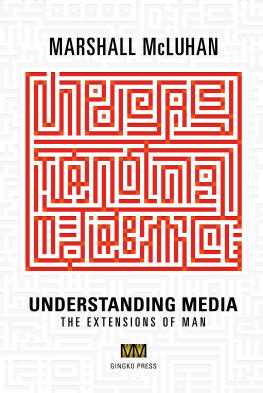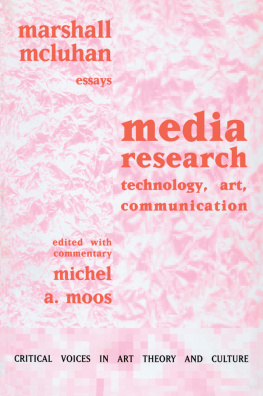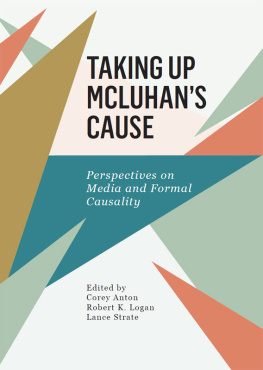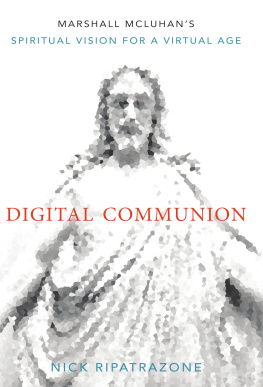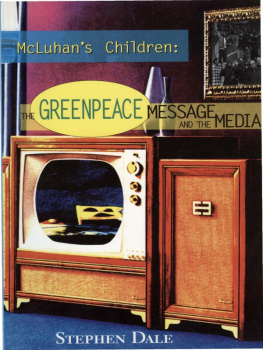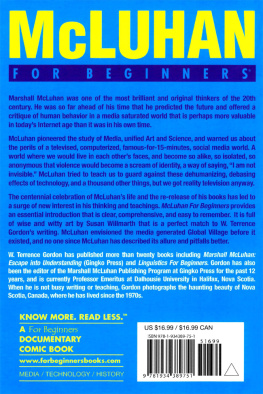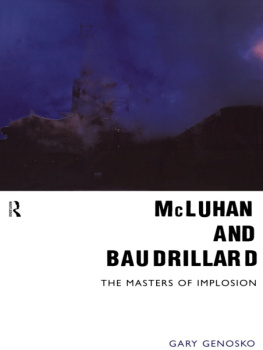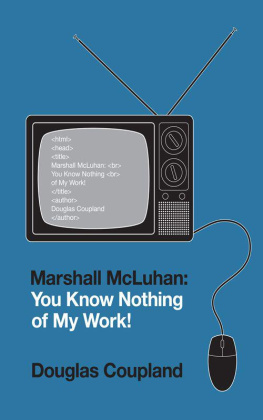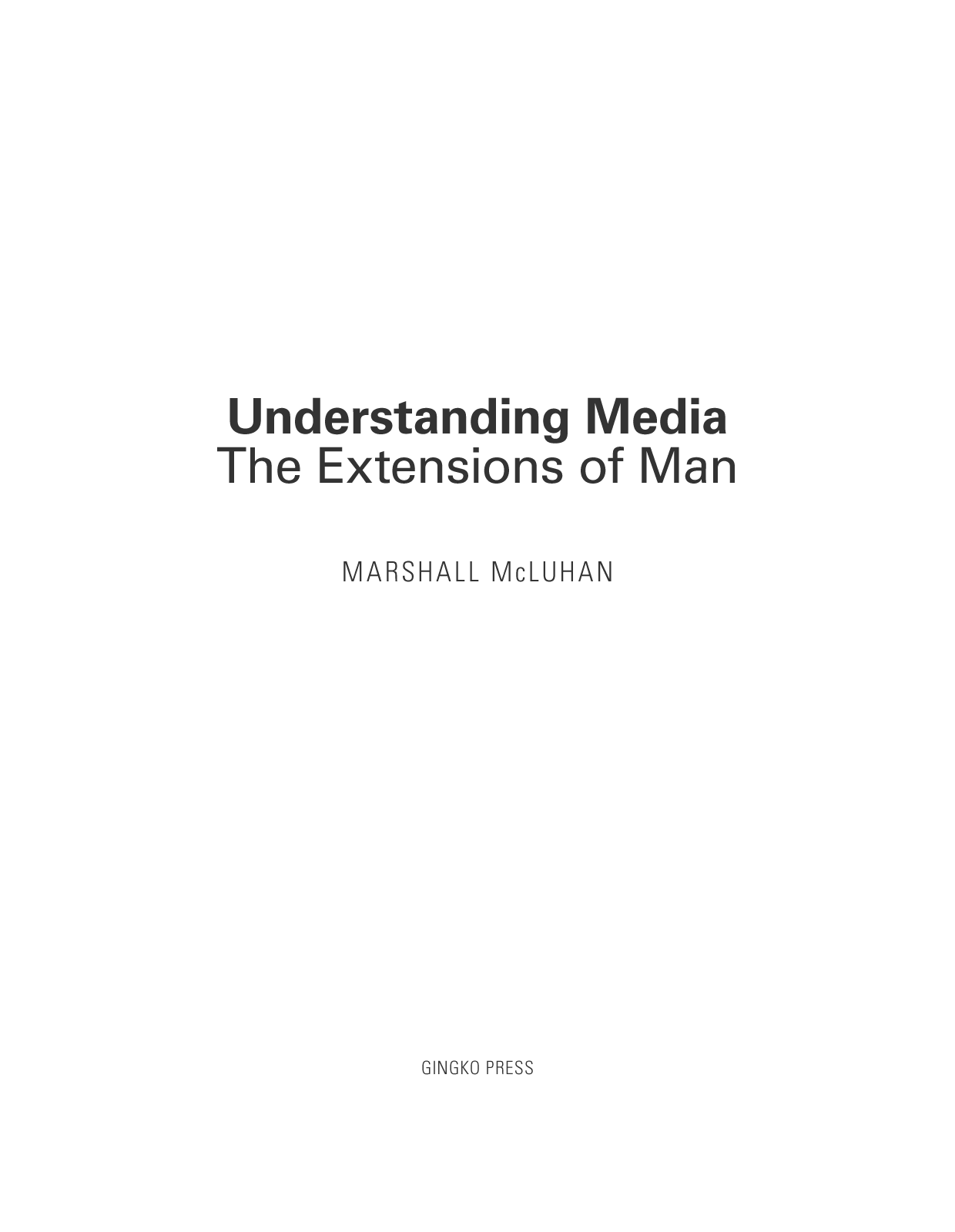GINGKO PRESS Inc., January 2013
1321 Fifth Street; Berkeley, California 94710
Phone (510) 898 1195, Fax (510) 898 1196
Email:
www.gingkopress.com
ISBN 978-1-58423-512-5
1964, 1994, 2013 The Estate of Corinne McLuhan
Electronic edition design: Scott Boms
All rights reserved. No part of this book may be reproduced or utilized in any form or by any means, mechanical or electronic, including photocopying and recording, or by any information storage and retrieval system, without permission in writing from the publisher.
Library of Congress cataloging in publication data:
McLuhan, Marshall, 1911-1980
Understanding media : the extensions of man / by Marshall McLuhan ;
p. cm.
Includes bibliographical references.
ISBN 978-1-58423-512-5
1. Mass media. I. Title.
P90.M26 2003
302.23dc21
2003012174
The author wishes to thank the publishers of the Times Literary Supplement for granting him permission to reprint the editorial of July 19, 1963, which appears in the chapter on The Printed Word in this book. Special acknowledgements are due to the National Association of Educational Broadcasters and the U.S. Office of Education, who in 1959-1960 provided liberal aid to enable the author to pursue research in the media of communication.

James Reston wrote in The New York Times (July 7, 1957):
A health director ... reported this week that a small mouse, which presumably had been watching television, attacked a little girl and her full-grown cat.... Both mouse and cat survived, and the incident is recorded here as a reminder that things seem to be changing.
After three thousand years of explosion, by means of fragmentary and mechanical technologies, the Western world is imploding. During the mechanical ages we had extended our bodies in space. Today, after more than a century of electric technology, we have extended our central nervous system itself in a global embrace, abolishing both space and time as far as our planet is concerned. Rapidly, we approach the final phase of the extensions of man the technological simulation of consciousness, when the creative process of knowing will be collectively and corporately extended to the whole of human society, much as we have already extended our senses and our nerves by the various media. Whether the extension of consciousness, so long sought by advertisers for specific products, will be a good thing is a question that admits of a wide solution. There is little possibility of answering such questions about the extensions of man without considering all of them together. Any extension, whether of skin, hand, or foot, affects the whole psychic and social complex.
Some of the principal extensions, together with some of their psychic and social consequences, are studied in this book. Just how little consideration has been given to such matters in the past can be gathered from the consternation of one of the editors of this book. He noted in dismay that seventy-five per cent of your material is new. A successful book cannot venture to be more than ten per cent new. Such a risk seems quite worth taking at the present time when the stakes are very high, and the need to understand the effects of the extensions of man becomes more urgent by the hour.
In the mechanical age now receding, many actions could be taken without too much concern. Slow movement insured that the reactions were delayed for considerable periods of time. Today the action and the reaction occur almost at the same time. We actually live mythically and integrally, as it were, but we continue to think in the old, fragmented space and time patterns of the pre-electric age.
Western man acquired from the technology of literacy the power to act without reacting. The advantages of fragmenting himself in this way are seen in the case of the surgeon who would be quite helpless if he were to become humanly involved in his operation. We acquired the art of carrying out the most dangerous social operations with complete detachment. But our detachment was a posture of noninvolvement. In the electric age, when our central nervous system is technologically extended to involve us in the whole of mankind and to incorporate the whole of mankind in us, we necessarily participate, in depth, in the consequences of our every action. It is no longer possible to adopt the aloof and dissociated role of the literate Westerner.
The Theater of the Absurd dramatizes this recent dilemma of Western man, the man of action who appears not to be involved in the action. Such is the origin and appeal of Samuel Becketts clowns. After three thousand years of specialist explosion and of increasing specialism and alienation in the technological extensions of our bodies, our world has become compressional by dramatic reversal. As electrically contracted, the globe is no more than a village. Electric speed in bringing all social and political functions together in a sudden implosion has heightened human awareness of responsibility to an intense degree. It is this implosive factor that alters the position of the Negro, the teenager, and some other groups. They can no longer be contained, in the political sense of limited association. They are now involved in our lives, as we in theirs, thanks to the electric media.
This is the Age of Anxiety for the reason of the electric implosion that compels commitment and participation, quite regardless of any point of view. The partial and specialized character of the viewpoint, however noble, will not serve at all in the electric age. At the information level the same upset has occurred with the substitution of the inclusive image for the mere viewpoint. If the nineteenth century was the age of the editorial chair, ours is the century of the psychiatrists couch. As extension of man the chair is a specialist ablation of the posterior, a sort of ablative absolute of backside, whereas the couch extends the integral being. The psychiatrist employs the couch, since it removes the temptation to express private points of view and obviates the need to rationalize events.
The aspiration of our time for wholeness, empathy and depth of awareness is a natural adjunct of electric technology. The age of mechanical industry that preceded us found vehement assertion of private outlook the natural mode of expression. Every culture and every age has its favorite model of perception and knowledge that it is inclined to prescribe for everybody and everything. The mark of our time is its revulsion against imposed patterns. We are suddenly eager to have things and people declare their beings totally. There is a deep faith to be found in this new attitude a faith that concerns the ultimate harmony of all being. Such is the faith in which this book has been written. It explores the contours of our own extended beings in our technologies, seeking the principle of intelligibility in each of them. In the full confidence that it is possible to win an understanding of these forms that will bring them into orderly service, I have looked at them anew, accepting very little of the conventional wisdom concerning them. One can say of media as Robert Theobald has said of economic depressions: There is one additional factor that has helped control depressions, and that is a better understanding of their development. Examination of the origin and development of the individual extensions of man should be preceded by a look at some general aspects of the media, or extensions of man, beginning with the never-explained numbness that each extension brings about in the individual and society.

